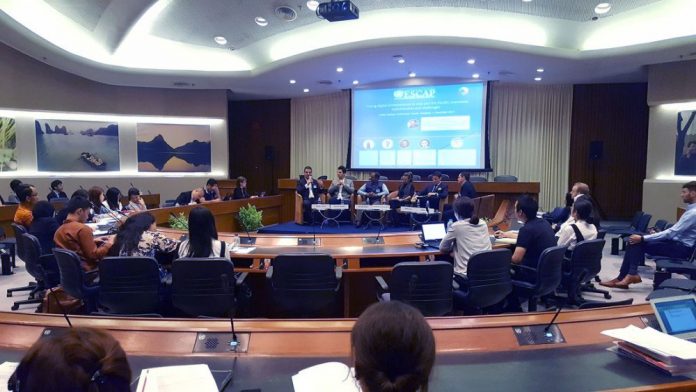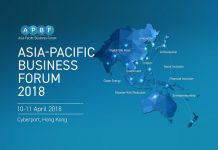The ESCAP (Economic and Social Committee for Asia and the Pacific) Trade & Investment week was held in the United Nations Center in Bangkok, Thailand between the 30th of October and the 1st of November 2017.
The event comprised with a meeting of The Task force of Youth and Women Entrepreneurship joined the ESBN (Escap Sustainable Business Network) in which the initiatives conducted in 2017 were shared, followed by the Trade and Investment Committee meeting and concluding with three panels on Youth Entrepreneurship and Digital Economy.
The purpose of the event was to promote dialogue about the opportunities and challenges faced by young entrepreneurs in a rapidly changing economic environment, where advances in information and communication technologies are spurring new ventures in multiple sectors at an ever-increasing speed.
Asia and the Pacific has the largest number of young people in the world – 717 million of the population is between 15-24 years old, corresponding to 60% of the worlds’ youth. In India, nearly 50% of the population is below 25 years of age. The energy and transformational drive of this large cohort of young people has the possibility to help rapidly drive development and transform societies in the region. Quality education and an enabling business climate for young people to start up, finance and run their enterprises will be key to tapping this growth potential. The ‘millennials’ that are entering business today have the possibility to drive rapid development of more sustainable ways of delivering products and services. To tap this potential, policy makers need to stay ahead and ensure that policies, infrastructure and financing sources meet the needs of budding young entrepreneurs in the new digital economy.
The importance of youth is also recognized in the 2030 Agenda for Sustainable Development and the Sustainable Development Goals (SDGs) which sets out to ‘substantially increase the number of youth and adults who have relevant skills, including technical and vocational skills, for employment, decent jobs and entrepreneurship’ by 2030 (target 4.4).
«We see a generation today that is Aware that we NEED to bring the business ecosystem into the future, helping people improve their present life for themselves and constructing the future for the next generation»
Pedro Eloy, Chairman of Young Entrepreneurs Task Force, ESCAP Sustainable Business Network, explained that the “Sustainability Development Goals current being implemented go beyond the sustainability traditional goals. Their amplitude and their scope is much higher and that somehow it captures some goals and objectives that in some part of the world they may be already there but in other part of the world may be of critical importance because otherwise we are going to keep increasing the development gap”.
.@PedroEloyC shares his views on how active participation of young entrepreneurs in the #DigitalEconomy can enhance #sustdev in #AsiaPacific pic.twitter.com/8HJfS9eLMt
— United Nations ESCAP (@UNESCAP) 3 de novembro de 2017
Pedro Eloy specified that in the Asia-Pacific region, “We can talk about projects that involve Women, or that involves resources like water, we can see the situation on the pacific island where we there are resources that need to be taken care, we see situations of pollution in the Asia-pacific specially in a couple of countries, so, we see a generation today that is aware that we need to bring the business ecosystem into the future, helping people improve their present life for themselves and constructing the future for the next generation.”
«Across Asia we have a problem of lack of access to credit for both entrepreneurs and SMEs and because of that there is an inability of people to build businesses or to grow businesses»
Mrs Isabella Carvalho Silva, Senior Management, Corporate Finance Strategy, EY and Mentor at Startup Bootcamp Fintech, explained that “Across Asia we have a problem of lack of access to credit for both entrepreneurs and SMEs and because of that there is an inability of people to build businesses or to grow businesses, and therefore they cannot contribute to the economy. So Fintech helps to bridge this gap of financing, enabling to bring new business models such as P2P Landing or Crowdsourcing of different projects or Online Factoring in order to offer direct credit lines to those in need”.
.@EY’s Isabella Silva on how #fintech services like crowdfunding help boost financial inclusivity for start-ups in Asia & benefit #sustdev pic.twitter.com/bEn53MZ0BR
— United Nations ESCAP (@UNESCAP) 3 de novembro de 2017
Isabella Silva also added that “We have here in Asia a high-educated people that can build real technology and that this is really surfacing. You can see peer B2B models that can use for example artificial intelligent technology or robotics to increase againg the efficiency of the whole financial system to benefit each and everyone of us in terms of development.”
To know more about the The ESCAP Trade & Investment week click on the link.
www.connectyet.org/initiative-escap-trade-investment-week.html
Young Entrepreneurs Web Site:
www.connectyet.org
Follow United Nations ESCAP:
www.twitter.com/UNESCAP










![How to be sucessful in 2018 – My Short List [Opinion]](https://www.asiastart.com/wp-content/uploads/2018/02/2018-focus-150x150.jpg)



